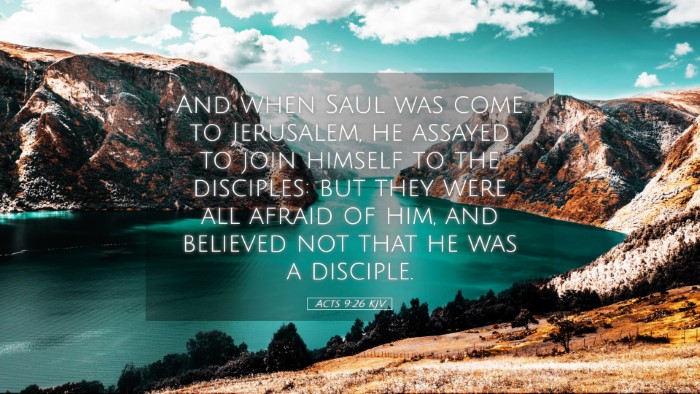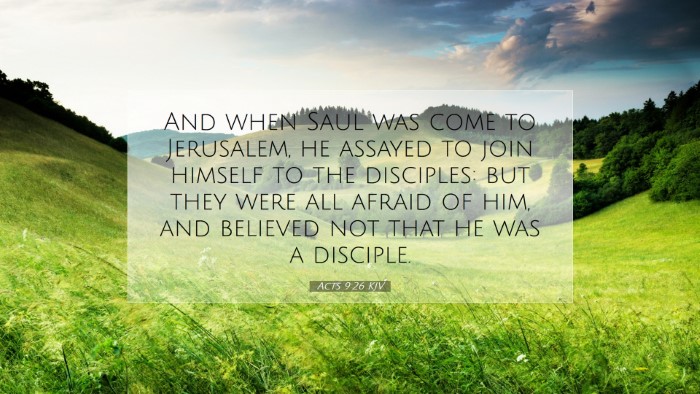Commentary on Acts 9:26
Introduction
The passage of Acts 9:26 marks a significant moment in the early Church, particularly highlighting the transformative journey of Saul of Tarsus, who later becomes known as the Apostle Paul. This commentary aims to explore the implications of Saul’s integration into the Christian community after his conversion, reflecting on the insights of various public domain commentators such as Matthew Henry, Albert Barnes, and Adam Clarke.
Text of Acts 9:26
“And when Saul was come to Jerusalem, he assayed to join himself to the disciples: but they were all afraid of him, and believed not that he was a disciple.”
Contextual Background
The importance of Acts 9:26 cannot be overstated as it captures the moment when Saul, having encountered the risen Christ on the road to Damascus, seeks fellowship with those he formerly persecuted. Understanding this context is crucial for grasping the societal and theological implications of his desire to join the disciples.
Historical Context
The backdrop of this narrative is the early Church facing persecution, with Saul being one of its most zealous adversaries. His transformation from a persecutor (Acts 8:3) to a proponent of the faith is underscored by the reluctance of the disciples to accept him, reflecting a deep-seated fear and suspicion.
Matthew Henry’s Insights
Matthew Henry notes the significance of Saul's attempt to join the disciples, stating that this illustrates the change of heart that occurs through genuine conversion. He emphasizes that Saul's previous actions had created doubt about his sincerity:
- Genuine Repentance: Henry argues that true repentance involves a desire for fellowship with other believers, which is evident in Saul's actions.
- Fear and Suspicion: The disciples’ fear is understandable; they had witnessed the devastation he caused and were rightfully cautious about his intentions.
Albert Barnes’ Reflections
Albert Barnes elaborates on the hesitance of the disciples, highlighting the tension that existed in the early Church concerning the inclusion of former enemies:
- Integration Challenges: Barnes points out that Saul's desire to be part of the community poses a challenge, reflecting the broader issues of acceptance within the Church.
- Faith and Trust: He emphasizes the importance of trust in the Christian community, suggesting that believers must reflect on the nature of grace and forgiveness when dealing with past oppressors.
Adam Clarke’s Viewpoint
Adam Clarke presents a more in-depth analysis of the implications of Saul's arrival in Jerusalem:
- Transformation as a Witness: Clarke suggests that Saul’s conversion serves as a powerful testimony to the transformative nature of Christ, which should inspire faith in others.
- Cautious Acceptance: He examines the psychological and spiritual implications of the disciples’ reaction, advocating for a balance between caution and openness to the power of God’s grace.
- Leadership in Unity: Clarke emphasizes that church leaders must navigate fears and skepticism to build a community grounded in the love of Christ.
Theological Reflection
This passage invites us to reflect on several key theological principles:
- The Nature of Conversion: The willingness of Saul to seek fellowship illustrates that true conversion compels individuals to seek communion with other believers.
- Community and Acceptance: The response of the disciples highlights the challenges of acceptance in a community marked by prior divisiveness.
- The Power of Grace: The narrative challenges us to consider how we view the grace extended to those who have harmed or opposed us in the past.
Pastoral Application
For pastors and church leaders, Acts 9:26 serves as a profound reminder of the importance of grace in ministry:
- Embracing Transformation: Encourage congregations to recognize that everyone is capable of transformation, and to create an environment that welcomes new believers.
- Building Trust: Develop structures within the church that help rebuild trust among members who have experienced betrayal or harm.
- Modeling Christ’s Love: Pastors should model Christ's love by being open to integrating individuals from diverse backgrounds and experiences.
Conclusion
Acts 9:26 offers profound insights into the challenges and opportunities that arise during the integration of former adversaries into the faith community. Drawing on the reflections of Matthew Henry, Albert Barnes, and Adam Clarke, we find a deeper understanding of the transformative power of grace, the importance of community, and the necessity of trust. For pastors, theologians, and students of the Word, this passage reminds us that the work of God is often most evident in the most unlikely individuals, as demonstrated in the life of Saul of Tarsus.


